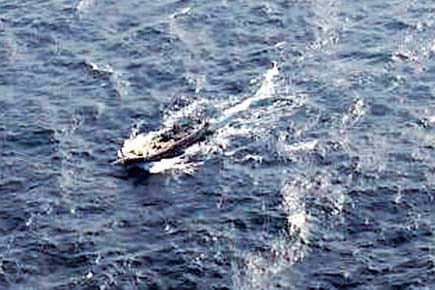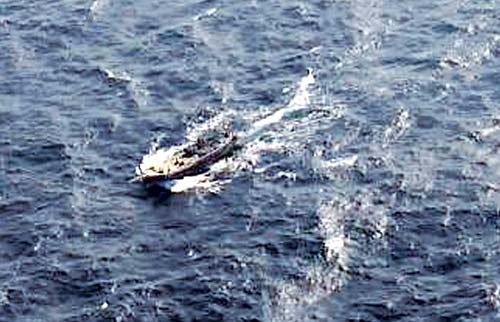These must be tense days for the security forces and intelligence agencies. There is heightened cross-LOC firing, repeated attempts at intrusion as Pakistan desperately looks for a diversion from Peshawar

 These must be tense days for the security forces and intelligence agencies. There is heightened cross-LOC firing, repeated attempts at intrusion as Pakistan desperately looks for a diversion from Peshawar. If the social media is any indication, then their aim is to somehow pin all blame on India for whatever has gone wrong, or will go wrong, in Pakistan. They wish to convince the world that they need continued support from them against an ‘expansionist’ India. The current psywar campaign in Pakistan is more to convince their own people of an imagined eternal threat rather than frighten India, because deep down there is a realisation that the trouble is from within and not from external factors.
These must be tense days for the security forces and intelligence agencies. There is heightened cross-LOC firing, repeated attempts at intrusion as Pakistan desperately looks for a diversion from Peshawar. If the social media is any indication, then their aim is to somehow pin all blame on India for whatever has gone wrong, or will go wrong, in Pakistan. They wish to convince the world that they need continued support from them against an ‘expansionist’ India. The current psywar campaign in Pakistan is more to convince their own people of an imagined eternal threat rather than frighten India, because deep down there is a realisation that the trouble is from within and not from external factors.

An aerial view of the Pakistani fishing boat that was intercepted by the Indian Coast Guard about 365 km off Porbunder in Gujarat on December 31, 2014. The boat eventually sank after it was blown up by its own crew members. File pic
ADVERTISEMENT
The forthcoming visit of President Obama for the second time to India, and that, too, without going to Pakistan, is another cause for ire in the Pakistani establishment more than anything else. Pakistan will continue to escalate tensions on the border, hoping to loom large in the India-US dialogue and also hoping that the escalation can be controlled after the visit.
All this would make intelligence and security agencies in India edgy, as for them the crisis of 26/11 and the many before that are memories that will always linger. Intelligence agencies normally function on a worst-case scenario and work from that high base, eliminating threats. It also known that smugglers are commonly used as couriers or even to provide cover to terrorists (Remember Mumbai 1993). Moreover, terrorists do not come wearing uniforms or carrying genuine identity cards. The task of intelligence agencies is to detect, deter, and help destroy threats, and none of this is easy.
But, that is not the main purpose of this article. This is only the context to what happened on the high seas off Porbunder on New Year’s Eve. An incident took place and within hours, we had judgmental comments, insinuating motives and attributing failures from the cosy comfort of our drawing rooms or in the limelight of TV screens. No one really knew what had happened, yet everyone had an answer. The only persons who knew were the men on board, who are presumed dead, or the men who challenged and chased the boat. The worst was the Congress party trying to score political points even in this case. One of the most important lessons from IC 814 and Mumbai 26/11 has been that our local agencies must be sufficiently empowered and authorised to act swiftly and effectively in good faith.
The boat was apparently in the wrong place at the wrong time, and the choice was limited take the challenge to its logical conclusion, including shooting it down or blowing up the boat as soon as possible. Inviting the suspects over for a cup of tea to find out their plans was not an option the Coast Guard or anyone else had at that time. The venue was close to Porbunder, where the Prime Minister was scheduled to visit, and there would have been a high-security alert prior to the visit. There was no foolproof way of ascertaining whether the boat was on an innocent mission, was probing defences, or on a live operation. Refusal to respond to the challenge should be enough cause for suspicion, and an attempt to sail away, more so. The choice was limited to challenge and intercept, or pretend nothing happened. Any worthwhile force would have taken the first option. The Coast Guard were not on a humanitarian mission; they acted on intelligence inputs. There is no “what if” in such circumstances.
Since different government departments have made statements, we will have to accept these, unless there is considerable evidence to the contrary. Surely, these must be based on informed intelligence inputs, and not on hearsay or speculation. Truth needs to be known (as facts are now emerging), but surely not by raising temperatures and drama on the screen.
After all the high-decibel debates have died down, it is important to plan for the future and accept that incidents of this kind will, unfortunately, happen again. No systems are perfect and they need constant upgrading. The other message is for all of us and our adversaries — which is that our guardians are alert and hopefully they will remain empowered to take action on their own, in future. These messages are best delivered quietly, without the kind of media hype that accompanies all India-Pakistan relations. Preconceived notions and opinions devoid of facts are dangerous.
The writer is a former chief of Research and Analysis Wing (RAW)
 Subscribe today by clicking the link and stay updated with the latest news!" Click here!
Subscribe today by clicking the link and stay updated with the latest news!" Click here!







